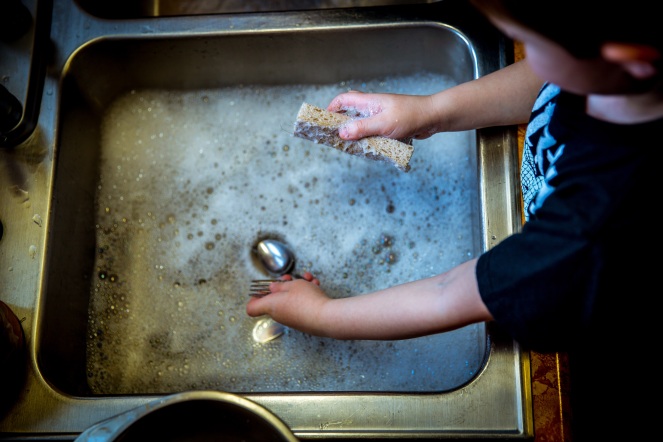
It’s taken me a week to prepare myself to wash my extremely long hair. The task seemed almost impossible after feeling fatigued the past several weeks. It got me thinking how do those with HNPP manage with menial chores?
People with chronic illness often have problems with housecleaning, chores and the control of clutter. Once a home reaches a certain stage of disarray, it can seem hopeless. Living this way contributes to emotional distress and social isolation, as people feel embarrassed about having guests or generally being near people.
“Have nothing in your house that you do not know to be useful, or believe to be beautiful.”
William Morris
It takes a combination of a lot of things to go from chaos to comfort. Identifying small practical steps you could take and then to do them one at a time. Putting your priorities in order however, is not an easy thing to do, especially when you are chronically sick. Even the simple act of making a small list gives can give you a headache.
After undertaking an interview to fill in a disability form for extra help, it became apparent how much help I needed. The interviewer said that if a task takes twice as long as previous while able-bodied – you do require some support.
So where to begin?
Now obviously, hiring a cleaning service or enlisting help from family members would save you a lot of heavy work. But that isn’t always an option. What’s realistically possible for you depends on your personal situation and health status, but here are general tips to keep a relatively clean and organised home if you’re chronically ill.
However, these are particularly important before commencing:
- Rest – being tired doesn’t mean you’re being lazy. If you feel sleepy, then rest! Siestas will become your best friend. Schedule them in if needs be. And switch off your electronic devices.
- Priority lists – take the things that you know cannot be avoided that day and put them at the top of your priority list. Things like feeding yourself / and your family, doing laundry. Then, take those same things and think about how you can simplify them. Slow cookers are great to just make a meal in one.
- Delegating – for those with families who are more able, you have the gift of many hands. For others, it may be a good friend that you can call upon in a time of need. Learning to ask for help is a bit of skill in itself. The saying that many hands make light work is so true.
- Do chores in an ‘ergonomically correct’ way – to overcome physical limitations or minimise pain, you might unknowingly adopt awkward postures that aggregate your symptoms. So pay attention to how you carry your body as you’re dusting high shelves or mopping up the floor. For example, try to keep your shoulders relaxed, use a step to reach spaces above your head or bend through your knees when lifting something off the ground. Stand firmly on both feet, hip-width apart, while you’re doing the dishes and rotate between different chores to avoid injury caused by repetitive motions. Think of housekeeping as a workout (which it is!) that needs to be performed with body awareness.
- Substitution and flexibility – somethings unexpected always come up. You may need to practice how to be flexible. I used to be very OCD with cleaning my flat, now I just shrug my shoulders and wait for when the time is a little more suitable.
- Congratulate yourself – come to see that, like other chronically ill people, you are always making a huge effort, so you always have something for which you can congratulate yourself.

Housekeeping
- Create systems to deal with clutter – sort the mail as soon as it arrives, instead of letting it pile up. Do a little washing up daily to avoid pyramids of plates – even better if you have a dishwasher where you can wait several days to fill it up. Dust off crumbs when you finish a meal. If you can’t that day, try it on the next.
- Change things gradually – if you have stacks of unused jars, bottles, newspapers, think about what you really need and if it is really necessary. Start throwing away bits and bobs, with your weekly recycling. This includes clothing, time yourself for 10-15 minutes, cleaning your closet a little every day. It may not clear it all – but it will start bringing the clutter down.
- Create simple routines – this can include sorting laundry or laying out each day’s clothes in advance. If you have guests, make sure everyone takes their own plates, a serving dish and silverware to the sink.
- Automate away – thanks to technology, many routine tasks can be set up on a schedule, from paying your monthly rent and utility bills to refilling your prescriptions. So find out if there’s a service or feature that will do recurring jobs automatically for you.
- Simplify your meal planning – meal planning is an excellent way to limit tiring trips to the supermarket, but it can be daunting to figure out what’s for dinner. To make things easier, you could collect a month’s worth of healthy recipes for each season and use that to create a weekly menu. If that’s too much hassle for you, you can also build your own personalised template with seven days worth of delicious dinners.
- List the grocery items you buy regularly – that way you’ll never forget to buy milk again.
- Keep house supplies on each floor or generally accessible – having a bucket with spray bottles, microfiber cloths and sponges at hand wherever you need them saves you from needlessly carrying items up and down the stairs. Place baskets at the bottom of the stairs to collect things that need to be taken upstairs.
- Create smart cleaning routines – clean rooms from top to bottom, so you won’t knock down dust from higher cupboards and shelves on recently vacuumed floors.
- Experiment with other energy-saving tricks – this may be hanging your clothes instead of folding them, sorting dirty laundry in separate hampers and collecting all used home textiles (towels, rags, (table) cloths, bed sheets) in one go.
- Consider a “no shoes indoors” policy – it drastically reduces the amount of dirt and germs tracked in.
- Build in buffer time – don’t leave things like grocery shopping and laundry until the last minute, right when you run out of food and clean clothes, that just adds unnecessary stress. Also, don’t plan too many cleaning sessions in a row, but leave enough time for rest in between.
- Find ways to conserve energy – sit down while you’re peeling potatoes or folding towels. Grab a stool during cooking if you have trouble standing. Consider home deliveries when going out to the shops is a tiring ordeal for you.
- On low-energy days – it may feel like all you accomplish is keeping things in their proper places. But that is an important part of housekeeping.

Shopping
- Check energy levels – if you’re extremely tired, divide the shopping list up into a couple little trips over several days.
- Driving to stores – if possible park near a cart corral so it’s easy to drop it off when you’re done.
- Pick a day that isn’t as crowded – if you’re not sure what days are less crowded you can always ask an employee. Or even check Google which shows when the quietest times are of most stores.
- Grab a shopping trolley instead of those little baskets – even if you’re running in for three little items, the odds are you’ll pass the water or juice and remember you’re running low. Now you’re left trying to lug those heavy extras around with you. Also, the cart is great to help keep your balance and offer a bit more support while walking.
- Bring a helper if you can – that way if you’re getting too tired to even let go of the cart you’ll have an extra set of arms to grab what you need. They also come in handy if you happen to remember you forgot an item, they can run back and get it.
- Getting ill/tired – if you just can’t continue don’t beat yourself up. If you see an employee, let them know that you’re sick and have to leave. They’d rather be notified so they can put away the frozen food instead of happening upon a full trolley with thawed items that now need to be thrown away.
- Arrange items on the conveyor belt according to where they go in the house – that way all the body wash and shampoo are in the same bags so you can just carry that bag to the bathroom. This also helps once you get home.
- Don’t be afraid to ask – if you’ve used a trolley and the store doesn’t allow them to leave the building you can ask the bagger to grab the cart so you can load the groceries in there to take out to your car.
- Online shopping – it’s an absolute godsend. You can sit in the comfort of your home, find what you need to buy online without even getting up. It does charge a delivery fee and most stores have minimum charge so wait for your big shop before ordering.
Assistive equipment
Having a helping hand when you suffer from pain, fatigue, weakened muscles or other symptoms can improve your independence and energy levels.
- Put your appliances to work for you – the dish washer, dryer, a programmable slow cooker. You could even consider investing in smart helps around the house like a vacuuming robot.
- Use supportive tools to make daily activities easier – stools, non-slip mats, long handled gardening tools or kitchen equipment specially designed for people with limited mobility and strength. Google which helpful aids are available for your specific health problems.
As anyone suffering with a chronic illness knows there are good days and bad days. And it’s important to remember you’re allowed to rest, ask for help and be as flexible as possible. Hopefully then, daily tasks will seem a little less daunting.

I think these are great tips for anyone! As for shampooing, my child with HNPP uses two shampoo brushes, one in each hand, to scrub the scalp instead of fingertips. Has really helped! Also gobs of conditioner to make combing easier too.
LikeLiked by 1 person
That’s an amazing tip! I’ll definitely add later this evening and I might use that myself!
LikeLike